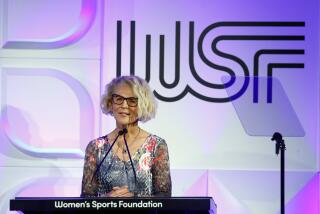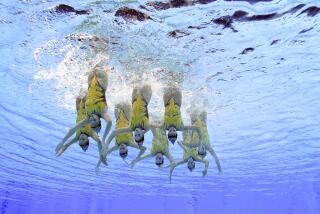She’ll Be Taking a New Tack : Sailing: Libbie Kamisugi hopes to become the first woman to enter the male-dominated world of America’s Cup racing.
SAN DIEGO — Ever since she was 12, Libbie Kamisugi had dreamed of making an ocean crossing in a sailboat. Now she is on the verge of making a historic crossing, entering the male-dominated world of America’s Cup racing.
“Frankly, it was beyond my vision,” Kamisugi said Friday afternoon on board the 12-meter America II in San Diego Bay. “I never thought I’d have the opportunity.”
It will be a week before Philip Freedman, chief executive officer of the Betsy Ross group, announces his choice of skipper for the syndicate’s entry. But Freedman has made it clear that Honolulu’s Kamisugi is the front-runner.
“I have files on five women,” Freedman said. “We looked at all the best professional women, and we felt because it will be the first time a woman skippers an America’s Cup boat, we had to have the most experienced one.”
Kamisugi has finished three Los Angeles-to-Honolulu TransPac races, finishing second in her class last year and fourth overall in 1983. She has sailed in many major regattas and was one of the first International Offshore Rule racers to receive major sponsorship.
Freedman said Kamisugi is well-suited to handle the heavy scrutiny the first female skipper in America’s Cup competition would most likely face.
“She’s going to be put under a microscope,” Freedman said, “but she’s not intimidated. She’ll be one tough cookie.”
Freedman is being scrutinized already. Critics say he’s trying to attract greater sponsorship, and publicity, by fielding a boat skippered by a woman and with several female crew members.
“People say we’re doing it to get sponsors, but so far, our sponsors aren’t for women’s products,” he said.
Freedman notified Kamisugi six weeks ago of his intention to have a woman on one of his boats--the Betsy Ross group plans to race two--for the 1992 America’s Cup. She was quick to tell him she wasn’t interested in a crew position.
“She said to me, ‘I’m not a crew member, I’m a driver,’ ” Freedman said. “I like that she’s not petite and quiet like you think she is.”
But petite she is. At 5-feet-4, 115 pounds, Kamisugi said she even hopes to shed a few pounds.
“I’m extremely strong for my size,” she said.
Kamisugi said he began lifting weights as the result of a conversation she overheard in the early 1970s. Before she made her first TransPac crossing, she was bothered when she heard a sailor talking about the dangers of a woman competing in such a race.
“He said he’d never take a girl on TransPac,” Kamisugi said. “He said he could just see himself falling overboard, and this little fragile hand with finger polish is going to pull him out?
“I heard that. I said to myself that I’m going to be as strong as I can be because that could happen. If you weren’t strong enough to hold onto someone, they could die. I took that very seriously.”
While she does have polish, it’s in her sailing and not just her nails.
Said one crew member on board America II: “I’ve followed her career for five years now, and she’s good.”
The Betsy Ross will be the first time a U.S. boat in the America’s Cup will be named after a woman. Freedman said he came up with the name when he considered Ross’ role in the revolution.
“It’s a first,” Kamisugi said. “Provided the performance is good, it’ll show that women aren’t really disadvantaged in certain positions on sailboats. I think there’s a place for men on boats, but there’s a place for women, too.”
Kamisugi grew up in Chicago and began sailing in small boats on Lake Michigan when she was 11. At 15, she won her first championship against men.
“I’ve never raced with or against women, I’ve always raced with and against men,” she said. “I grew up with a mixed identity. I didn’t know I wasn’t supposed to do those things. My father always told me there wasn’t anything I couldn’t do.”
Neither is Kamisugi as serene as she appears to be.
“I’m not a very pushy leader,” she said. “I speak softly, but it’s not that I don’t take control. I do, but I run a democratic ship compared to many.”
Kamisugi traces her reputation to tenacity and a willingness to learn from those around her. When she first started sailing big boats in Honolulu, she challenged herself to sail the short distance to the island of Hawaii and not get sick. She accomplished that goal in part.
“I got good at being sick,” she said. “I kept doing it until I got used to getting sick. It’s not like I don’t have the same problems as other people do (at sea), it’s just a willingness to stick out there and suffer.”
And she isn’t too proud to surround herself with experts and learn from them.
“Whenever possible,” she said, “I will take on board my boat the very best sailors I can get. I welcome their input. I try to profit from their experience so when I get off, I’m better than when I got on.”


